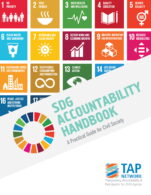Social audits, community score cards and citizen report cards
By localizing SDG 16 oversight mechanisms and creating pathways for citizens to monitor progress towards the SDGs from local to global levels, stakeholders can obtain more reflective data to measure progress in reaching marginalized communities while fostering ownership and promoting local delivery of the SDGs in the process
In order to realize peaceful, just and inclusive societies and ensure that no one is left behind, it is crucial that all SDG16+ processes, particularly effective accountability processes, are inclusive, developing from the ground up. In other words, accountability for SDG16+ must be “localized” at the subnational and local level for a meaningful and inclusive realization of the 2030 Agenda.1
By localizing SDG 16 oversight mechanisms and creating pathways for citizens to monitor progress towards the SDGs from local to global levels, stakeholders can obtain more reflective data to measure progress in reaching marginalized communities while fostering ownership and promoting local delivery of the SDGs in the process.2
CSOs should engage with communities and facilitate their direct connection to local authorities to ensure that the SDGs actually deliver for communities. Informal or “claimed” spaces are opportunities for dialogue that are brokered by civil society or communities rather than government. There are several powerful tools for social accountability that CSOs and other actors can initiate at the grassroots level. These approaches typically serve to gather crucial evidence about local-level service delivery and mobilize the political power of local communities to press local authorities for improvements.3

These tools and mechanisms include:
When deployed strategically, social accountability approaches to evaluate initiatives for peaceful, just and inclusive societies can lead to important impacts on development outcomes at the local level.12 Social accountability evidence facilitates constructive and evidence-based dialogue about citizens’ experience. CSOs can work within their community and with other organizations to monitor services across whole regions, aggregate evidence, and press for more systemic change. This type of “vertical integration” is particularly important for creating the kind of grassroots-to-global accountability needed in the context of the SDGs.13
Rather than replacing official sources, these approaches complement them and reveal patterns in public service and project delivery that official statistics might hide, particularly the perspective of marginalized communities.14 Given the complementary character of this type of data, the capacity of census bureaus should be strengthened to include it in official reports so that civil society can contribute critical evidence that helps improve decision making and accelerates SDG progress. 15 This requires greater investment from actors at all levels, particularly donors, implementation actors, and public officials, for greater investment at the subnational and grassroots levels to empower communities to support SDG accountability.16
Case Study


Case Study
Training Citizen Monitors to Safeguard Community Development
Integrity Action
Integrity Action worked with partner organization Kwale Youth and Governance Consortium to implement their citizen monitoring approach in Kwale, Kenya. Citizens from the community were selected with the approval of the whole community and trained using Integrity Action’s resources and approach. Trained monitors were able to gain the tools to oversee the delivery of local projects and services, compare what was promised with what was delivered, report it publicly on Integrity Action’s app DevelopmentCheck and then work with those responsible to get the issues addressed for the benefit of the community. The training and skills have allowed the monitors to feel more confident, benefit their community and be proactive to ensure that services and projects are delivered as promised.
Before this intervention, according to a community monitor in the program, “No one seemed to care whether public projects were being implemented in the right way due to lack of information on the technicalities.” There were many projects that had stalled for a long time. These included construction of halls supported by the Kinango Constituency Development Fund, Amani Primary School, Kinango Primary, Banga Primary and Bishop Kālu Primary School in Kwale, Kenya. The ongoing delay of these projects perpetuated low trust and frustration toward the local government.
In Kwale, many structures for participation existed, such as the public participation forums, but people were not aware of how to engage with them. There was a need for these meetings to become accessible (ex. take place at suitable times) and for the communities to be informed in advance about the date, location and methods for joining such meetings. The citizen monitor training raised awareness about these gaps.
Key Take-aways: Using a collaborative approach by including the community and various actors can be a proactive way to ensure that services and projects are delivered as promised. It is important to eliminate finger-pointing or accusations of corruption that commonly cause people to become defensive. Instead, it can be effective to lean on community members who have the information needed for approaching a situation sensitively and carefully, involving everyone from the start and explaining why it is fair that the community receives the services promised. Raising awareness within the community as to what they are entitled to can also help in this regard.
SDG Accountability Handbook: A Practical Guide for Civil Society (TAP Network, 2018)
This handbook provides guidance on the different approaches and steps that can be taken by civil society to ensure accountability for the SDGs. For more on localized accountability measures, see the chapter: ‘Engaging Local Authorities.’ Available at: https://sdgaccountability.org/

This publication provides detailed implementation instructions for the use of social accountability tools to engage local authorities.
Available at: http://documents.worldbank.org/curated/en/513571468059674130/pdf/718040WP00PUBL0ebook0English0Final0.pdf
Produced by World Vision, this publication contextualizes and applies its social accountability approach in more than 40 countries with positive results.
Available at: https://www.wvi.org/sites/default/files/CVA_Field_Guide_0.pdf
The sourcebook provides detailed implementation instructions for the use of social accountability tools to engage local authorities.
Available at: http://documents.worldbank.org/curated/en/513571468059674130/pdf/718040WP00PUBL0ebook0English0Final0.pdf
The CARE Community Score Card serves as the basis of much of the social accountability work of the past two decades.
Available at: https://www.care.org/sites/default/files/documents/FP-2013-CARE_CommunityScoreCardToolkit.pdf
The World Bank’s Open Knowledge Repository provides more information about grievance redress mechanisms.
Available at: https://openknowledge.worldbank.org/handle/10986/20117
Learn more about social audits in the Centre for Good Governance’s report, Social Audits: A Toolkit – A Guide for Performance Improvement and Outcome Measurement.
Available at: http://unpan1.un.org/intradoc/groups/public/documents/cgg/unpan023752.pdf
Learn more about how to develop effective community scorecards in Rapid
Feedback: The Role of Community Scorecards in Improving Service Delivery.
Available at: http://documents.worldbank.org/curated/en/462221468333561977/pdf/884970WP0Rapid00Box385225B00PUBLIC0.pdf
This report outlines learning on how different kinds of citizen-centred accountability (CCA) systems – including citizen monitoring, social audits, mobile-based feedback systems and procurement monitoring – can be designed so that they have the greatest chance of being sustained.
Available at: https://integrityaction.org/media/16126/making-citizen-centred-accountability-last-integrity-action-research-report.pdf

Transparency, Accountability &
Participation (TAP) Network
Address: 205 E 42nd St.
New York, NY 10017
Email:
[email protected]